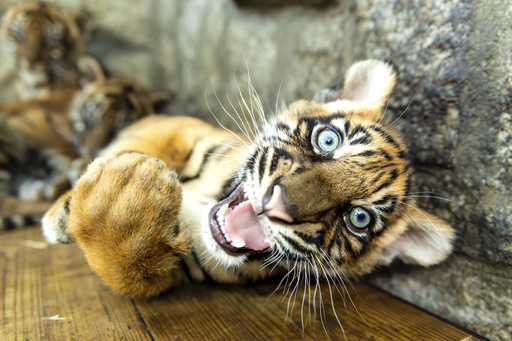
WARSAW, Poland — A Polish zoo has happily announced the birth of four Sumatran tiger cubs, revealing the news on Friday after several weeks of discretion, primarily due to concerns about their survival. The Wroc?aw Zoo, located in the southwestern city of Wroc?aw, confirmed that the cubs were born on July 22 and decided to keep their birth under wraps until the little tigers had grown stronger and received their vaccinations, explained zoo spokesperson Weronika ?ysek.
As of now, each cub weighs over 8 kilograms (roughly 18 pounds), which is about twice the size of a domestic cat. “The happiness is amplified by the fact that all four tigers are healthy, active, and enjoy eating and playing both with one another and their parents,” noted Sergiusz Kmiecik, the acting president of the zoo. Notably, the Wroc?aw Zoo has been involved in the breeding of Sumatran tigers since the 1960s.
The cubs are the children of mother Nuri and father Tengah, who just four years ago welcomed a female cub named Surya, now residing at a zoo in Cottbus, Germany. The zoo celebrates this new litter as “a breeding achievement of global significance.” Pawe? Sroka, who heads the department of predatory mammals at the zoo, emphasized the unique behavior of Tengah, who has remained with the cubs since their birth—a rare occurrence among tigers. “He has been calm, gentle, and even assisted Nuri in caring for the cubs, adapting to handle them effectively,” he remarked.
The zoo also expressed excitement that the current cubs consist of three males and one female. Since European zoos often have a higher number of female tigers, the birth of three males will contribute positively to the population balance in zoos across Europe. As for the future of these cubs, their permanent homes remain undecided, as they still have more growing to do, according to ?ysek. They have yet to be given names, but there are plans to involve the zoo’s visitors and fans in the naming process.
Sumatran tigers are the most critically endangered subspecies of tigers, facing various threats such as poaching and habitat loss due to deforestation. With fewer than 400 individuals remaining in the wild, the Wroc?aw Zoo is actively engaged in efforts to promote their conservation through its dedicated foundation, aiming to protect this vulnerable species.
